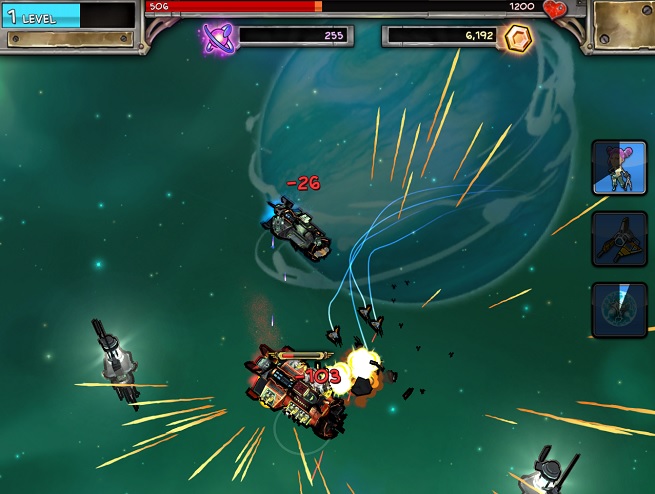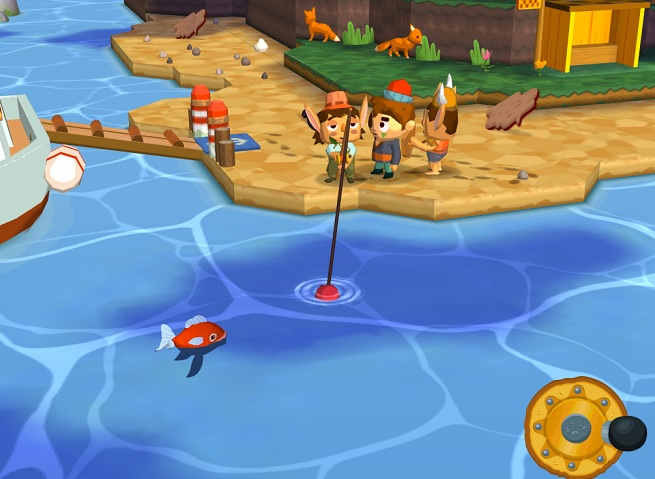Julian Farrior cashed out big time last year when Hasbro paid $112 million for a majority stake in his five-year-old mobile game development studio, Backflip Studios. The Boulder, Colo.-based Backflip had made hit games like Army of Darkness: Defense, Ragdoll Blaster, Paper Toss, and Dragonvale.
But instead of kicking back, Backflip has gone into hyperdrive. Since the acquisition, Backflip has hired 35 people and has more than 100 employees. And now it’s getting ready to launch some ambitious free-to-play mobile titles. Instead of going out to pasture, Farrior is doubling down on mobile game development to produce more of the kind of games that have garnered more than 300 million downloads since Backflip started in 2009.
“It’s going remarkably well, in part because [Hasbro is] a toy-brand company,” Farrior said in an interview with GamesBeat at the recent Game Developers Conference 2014. “Their expertise isn’t in mobile gaming. As a result, they rely very heavily on what we want to do and where we want to go. Seven months into this, they are giving us great autonomy.”
Last year, Dragonvale was still the No. 13 top-grossing game, even though it was 2.5 years old. In the meantime, Backflip has been working on what it calls “high yield” games. It figured out early on it could use shorter-duration games as user-acquisition tools, driving traffic to the lucrative games that it spent more time on. The company does small updates every couple of weeks and big updates every quarter.
“Premium games aren’t the high-yield games today, and they seem to have a finite life,” Farrior said.
After selling the big stake to Hasbro seven months ago, Backflip started a publishing business, where it will distribute and market mobile games for other mobile game creators. It hired Simon Jeffery, a seasoned game publisher with experience at Ngmoco and Sega of America, to head Backflip’s third-party publishing business.
Under that program, Backflip is publishing a couple of major games soon. One of these is Plundernauts, a cell-shaded sci-fi spaceship combat game from LightBox Interactive, an Austin, Texas game studio that made console games like Starhawk and Warhawk. The game features epic pirate space battles where players can raid and plunder other starships.
“My core team knows how to make games, but we know jackshit about mobile games,” said Dylan Jobe, the head of LightBox, which has eight people. “We had an idea to put a visceral explosion experience into mobile. We tried to distill and epic mobile space battle into discrete mobile experiences.”
The battles take a minute or two. You can interact with the cell-shaded spaceships using a finger. It is a hardcore experience repackaged as a free-to-play mobile game. I saw a demo, and it looks like a lot of fun. It has player vs. player (PvP) multiplayer, and it should arrive this spring in the app stores.
“In seeing a console team go to work on this, we saw a concept and level of quality that we hadn’t seen in the mobile market yet,” Farrior said. “We think the big win is in investing in your ship and going out to fight together.”
Backflip is also publishing Seabeard from HandCircus, which is like a mobile take on Nintendo’s cherished Animal Crossing social sim with a distinct art style. HandCircus previously created Okabu for the PlayStation 3 and Rolando for the iPhone in partnership with Ngmoco.
Backflip will also marry the brands at Hasbro with the short-duration games and use them as user acquisition tools. Backflip emphasizes its experience in mobile, game design, monetization, and marketing. About half of the company’s internal games will be on original ideas while the rest will be on Hasbro brands. (These include big names such as Monopoly, Transformers, and G.I. Joe.)
Backflip recently absorbed Team Phobic, a developer that worked on Dragonvale. That team is making a title called Epic Island, where you battle enemies and monsters. It’s a loot-gathering, dungeon-fighting role-playing game.
Among the internal games is Spellfall, a tile-based role-playing fantasy game. It’s a bit like Puzzle & Dragons, where you solve puzzles in a role-playing game, casting magical spells to defeat evil monsters.
“We don’t consider this a fast follower of Puzzle & Dragons,” Farrior said. “It’s the kind of game that we wanted to make. The way it plays is not like that game. You are always trying to create better spells. You attack your enemy and it goes back and forth. The only thing that is similar is picking up a tile with your finger and moving it somewhere else.”
Another internal game is Dwarven Den, a game where you tap the screen to get dwarves to dig at barriers inside a mine. It’s a bit like Minecraft, and the fun is in digging and finding little treasures. The game is like the old King’s Quest games, where you unravel a mystery. You have to find energy and blue crystals to gain special powers. It has more than 100 levels and it has been in the works for a long time.
“I don’t know if the market really wants a mining-meets-puzzler game, but maybe it does,” Farrior said. “This is a game we want to build. We like to make bets. And here we’re betting on the marriage of genres. So we’ll see.”
VentureBeat's mission is to be a digital town square for technical decision-makers to gain knowledge about transformative enterprise technology and transact. Learn More






![Reblog this post [with Zemanta]](http://img.zemanta.com/reblog_e.png?x-id=40064dc9-3313-46ed-83a4-a4e4044180b0)
